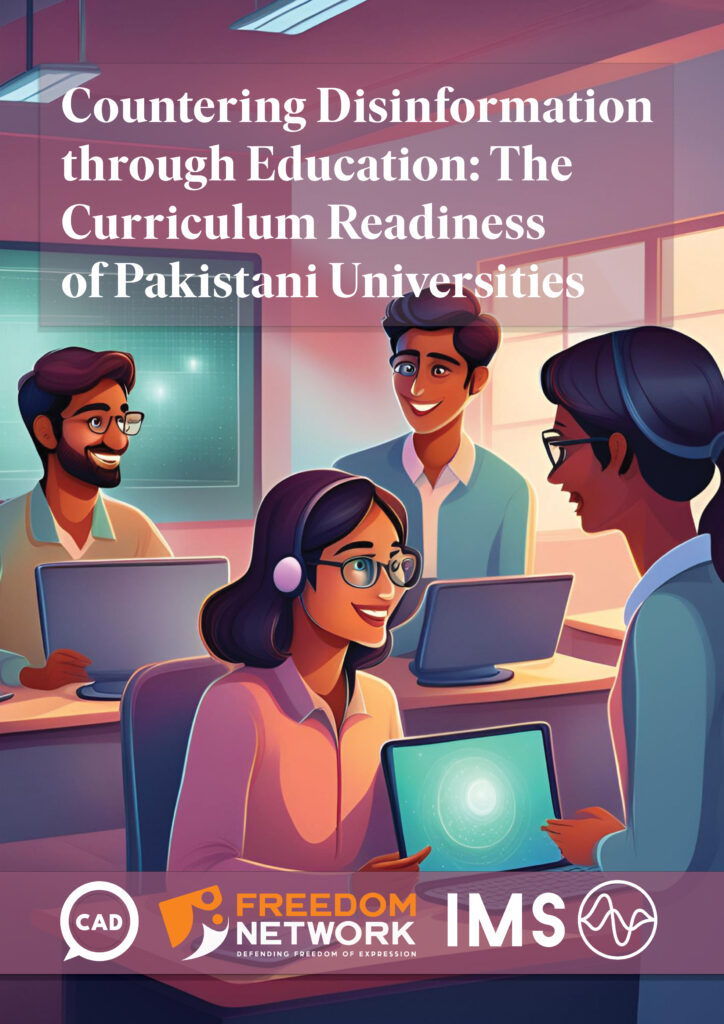The CAD report examines the readiness of local universities to teach courses on countering disinformation.
Educational responses for countering disinformation offer an alternative approach to strict regulatory actions that may weaponise online speech against citizens and undermine their freedom of expression and access to information. These educational responses, based on Media & Information Literacy (MIL) competencies and critical thinking, need institutional support, customisation and scale in order to be effective. A starting point for testing these educational interventions is to introduce courses in the higher education curriculum. Mass communication or journalism departments at local universities are best placed to pilot this approach. The faculty at these departments already looks critically at the information landscape and has a responsibility towards preparing graduates that are competent in information integrity principles and MIL skills for their future work in the media and communication sectors.
The Coalition Against Disinformation (CAD), with support from IMS and Freedom Network, conducted a mapping study to determine the readiness of the curriculum of mass communication departments of local universities in terms of offering courses related to MIL, countering disinformation and fact-checking. The study also examined the needs and capacities of the departments. Data for the study was collected through a survey. The findings are based on responses from 39 media departments. Additionally, responses from the computer science departments of the same universities were collected to identify inter-disciplinary collaboration. The study also provides a cross-cutting focus on education on AI skills.
Findings: The results show that the media curriculum as of 2024 is largely not ready to address contemporary issues of disinformation and AI. Moreover, the media departments lack trained faculty and technology resources to offer pedagogy in these areas. In brief, the findings show:
> Around 87% of the 39 media departments do not offer a dedicated course related to MIL or countering disinformation.
> Most media departments — around 80% — do not have any faculty member with MIL skills or industry experience.
> Most media departments need assistance with faculty training, technology infrastructure, course development and external collaboration for MIL course delivery.
Recommendations: Based on the findings, the study offers the following recommendations for relevant stakeholders.
> Update higher education policies to include MIL and AI focus: The HEC should update its higher education policies to build a direct learning focus on MIL skills.
> Revise curriculum to include MIL and AI topics: The HEC’s curriculum revision committees should consider inclusion of MIL courses in their respective discipline’s curriculum. The study provides a model course outline for this purpose.
> Introduce courses on MIL and AI: Universities should also proactively introduce courses on MIL and AI topics where they have flexibility to do so within the curriculum using their internal academic approval procedures.
> Invest in faculty training and technology: Universities must invest in faculty training to increase the capacity of instructors on MIL and AI topics. Academic institutions also need to invest in their tech infrastructure to ensure effective skills-based education.
> Facilitate inter-departmental collaboration: Universities should capitalise on opportunities available them to internally by facilitating their different departments to collaborate for faculty development and course development.
> Offer training, advocate for policy changes and foster collaboration: Civil society organisations and other supportive stakeholders should offer training opportunities for university faculty on countering disinformation skills, lobby with the HEC to include MIL courses in curriculum, and facilitate partnerships among academia, media, the tech sector and others to provide collaborative responses to online disinformation.
The Coalition Against Disinformation hopes the findings, recommendations and appendices of the study will help educators, higher education institutions, researchers and other stakeholders in countering disinformation in Pakistan more effectively through educational interventions.

